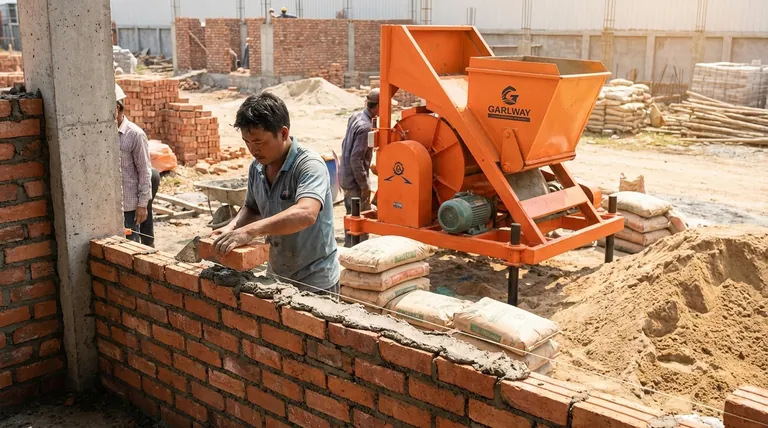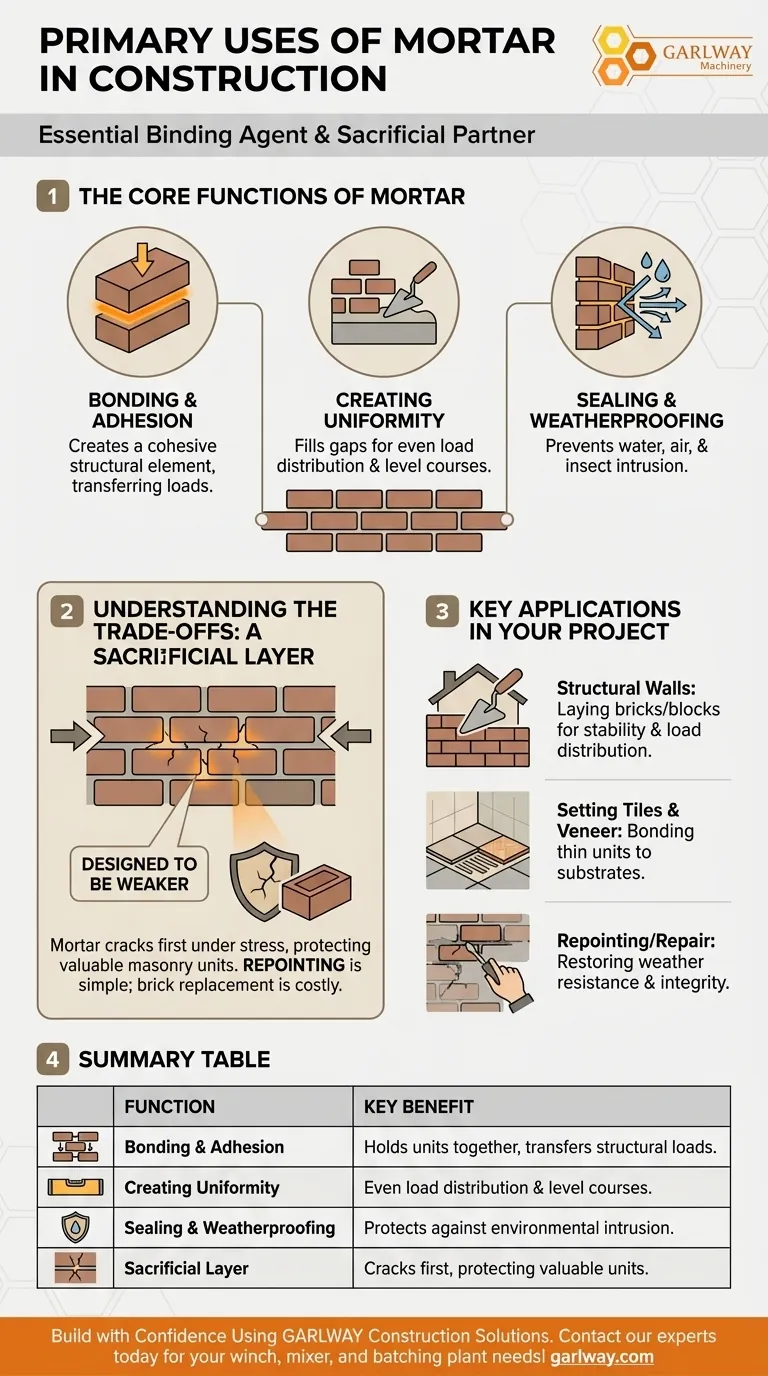In construction, mortar is the essential binding agent used to join masonry units like bricks, stones, or blocks into a single, durable structure. Its primary function is to act as an adhesive, but it also serves to create uniform spacing and seal the joints against weather.
Mortar is more than just glue; it is a workable, sacrificial layer engineered to bond masonry units together while being intentionally weaker than the units themselves, protecting them from damage over time.

The Core Functions of Mortar
Mortar performs several critical roles in any masonry project. While its most obvious job is adhesion, its other functions are just as vital for the longevity and stability of the structure.
Bonding and Adhesion
The most fundamental use of mortar is to bond individual components into a cohesive structural element. Its adhesive properties ensure that bricks, blocks, and stones are held firmly in place, creating a unified wall or surface.
This bond allows the transfer of weight and stress down through the structure to the foundation.
Creating Uniformity
Masonry units are rarely perfectly uniform in size or shape. Mortar fills the gaps between them, creating level, evenly-spaced courses.
This function is critical for distributing the load evenly across the entire structure, preventing stress from concentrating on a single point, which could lead to failure.
Sealing and Weatherproofing
The joints filled with mortar act as a crucial seal. They prevent water, air, and insects from penetrating the wall assembly.
Properly applied mortar is the first line of defense against moisture intrusion, which is a primary cause of material degradation and structural damage.
Understanding the Trade-offs
Mortar's most misunderstood characteristic is its strength. The goal is not to create the strongest possible bond, but rather the right bond for the specific application.
Designed for Repair, Not Immortality
High-quality mortar is intentionally designed to be softer and weaker than the masonry units it surrounds. This may seem counterintuitive, but it is a critical feature.
Over time, buildings settle and materials expand and contract with temperature changes. This movement creates stress within a wall.
Why This is a Feature, Not a Flaw
Because the mortar is the weakest component, it is the part that will crack under stress. This is a deliberate design choice.
Repairing a cracked mortar joint—a process called repointing—is simple and inexpensive. Replacing cracked, spalled, or broken bricks is far more difficult and costly. The mortar acts as a sacrificial element, protecting the more valuable masonry units from damage.
Key Applications in Your Project
Choosing and using mortar correctly depends entirely on your specific goal.
- If you are building a structural wall: Mortar is the essential binding agent used to lay bricks, blocks, or stones in uniform courses, ensuring load distribution and stability.
- If you are setting tiles or stone veneer: A specialized, adhesive-rich mortar provides the bonding bed that secures tiles or thin veneers to a substrate like a floor or wall sheathing.
- If you are repairing old masonry: A compatible repointing mortar is used to replace deteriorated joints, restoring the wall's weather resistance and structural integrity without damaging the original bricks.
Understanding mortar's true role as a workable, protective partner to masonry is the key to building resilient and long-lasting structures.
Summary Table:
| Function | Key Benefit |
|---|---|
| Bonding & Adhesion | Holds bricks/blocks together, transferring structural loads. |
| Creating Uniformity | Fills gaps for even load distribution and level courses. |
| Sealing & Weatherproofing | Protects against water, air, and insect intrusion. |
| Sacrificial Layer | Designed to crack first, protecting valuable masonry units. |
Build with Confidence Using GARLWAY Construction Solutions
Just as the right mortar is crucial for a durable masonry structure, the right machinery is essential for your construction project's success. GARLWAY specializes in providing robust construction equipment—including winches, concrete mixers, and batching plants—to help construction companies and contractors achieve superior results efficiently.
Let us help you build stronger. Contact our experts today to discuss your equipment needs!
Visual Guide

Related Products
- JDC350 Small Cement Concrete Mortar Mixer
- Auto Concrete Cement Mixer Machine New
- Commercial Construction Mixer Machine for Soil Cement Mixing Concrete
- Construction Products Concrete Plant Machine Mixing Concrete Mixer
- Ready Mixer Machine for Construction Ready Mix Machinery
People Also Ask
- What factors determine whether a winch is necessary for overlanding? Essential Guide for Self-Recovery
- What are the core components of a marine hydraulic winch system? Unlock Reliable Power for Your Vessel
- Why should personnel stay clear of a suspended load? Prevent Catastrophic Injury or Death
- What types of wire rope hoists are available? Choose the Right Hoist for Your Heavy-Duty Lifting Needs
- What factors should be considered when choosing a winch? A Guide to Safe & Effective Selection
- Why are hydraulic towing winches considered versatile? Unmatched Power and Reliability for Demanding Jobs
- How does vehicle size affect winch usage? Choose the Right Winch for Your Truck's Weight
- What is required of management regarding electric hoist safety? Build a Proactive Safety Culture

















